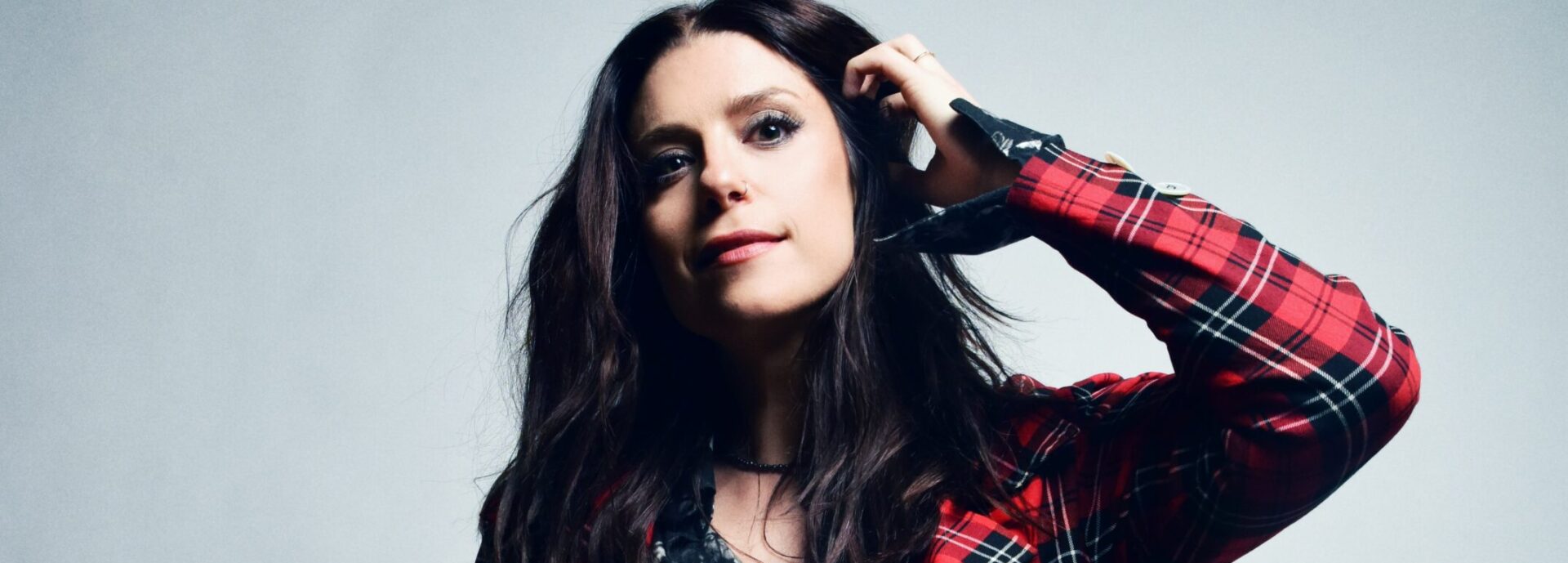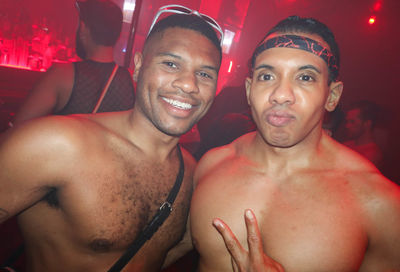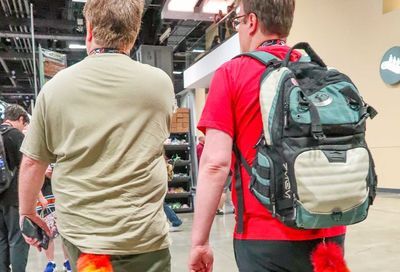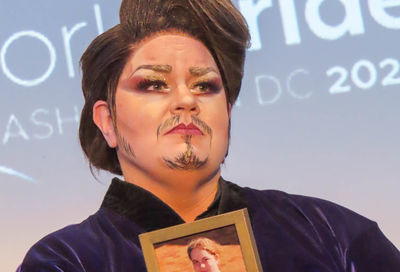Healing Humor
Karen Williams brings laughter and enlightenment to NBJC's 'Power of Us'
Karen Williams has been a Buddhist for 36 years and a comic for 25. She’s a mother, a grandmother and queer. And if you don’t want to impress her as rude, don’t ask her age. Audiences of the lesbian-comic movie, Laughing Matters, already know this, watching Williams riff on coming to terms with being black, being a woman, being gay — but getting older??
Her sense of humor helps her cope. Actually, she takes humor so seriously that she crafted her own major at Cleveland State University: humor and healing.
”Many people are not even aware that they are living in a ‘no, but…’ life,” says Williams, who considers herself a perpetual optimist, thanks to lessons she’s learned along the way. ”’No’ really negates everything. One of the first rules in comedy is ‘yes, and….’ You go with what you’re presented and, in a certain sense, you make lemonade out of lemons.”
That’s the principle she’ll bring to the Power of Us National Convention, as she performs and participates in this groundbreaking gathering, April 24-26 in Baltimore, produced by the National Black Justice Coalition.
Sylvia Rhue, the NBJC’s director of religious affairs and constituency development — and a longtime friend of Williams — can’t wait.
”I wouldn’t miss her act for anything,” Rhue enthuses. ”It’s worth missing dinner for.
”She brings insightful laughter. This is the Power of Us, and it’s about how we can all work together for common goals. Humor is very important, to laugh at ourselves and other things. It’s very healing.”
Beyond her self-styled major, Williams couldn’t agree more, having founded the International Institute of Humor and Healing Arts, aka the HaHA Institute.
From her home in the Cleveland area, Williams spoke recently with Metro Weekly about humor and healing, motherhood and mindfulness.
METRO WEEKLY: Being in Ohio, you must be in the grip of election fever.
KAREN WILLIAMS: I’m not the best person to talk to about election fever, but I did catch the fever in the last election and participated in ways I hadn’t before. Certainly, with this election, I’m more aware.
MW: Do you have any strong feelings this time? Are you campaigning?
WILLIAMS: Well, you know, that’s very interesting. I just read a quote this morning: ”[T]here can be no true democracy unless the citizens of a country realize that they are sovereign, that they are the main protagonists and then with wisdom and a strong sense of responsibility take action based on that realization.”
It’s from one of my little Buddhist books and it’s what I’ve always felt. I never really put that much energy into any one person being able to change the lives of the general populace. And certainly after this tenure that we’ve had, I think it would take about 10 terms before anybody can undo all the damage.
MW: So, does that leave you optimistic about 2008?
WILLIAMS: I’m optimistic, period. I’m optimistic because I believe in the power of the people. And I think that people are now becoming aware — through the fact that we are at war, through global warming issues, through ecological changes, through lives being threatened — that we the people have to do something. We can’t just wait.
I think the grassroots efforts going on in this country, day by day, by the citizenry, are going to make a difference much more than who’s president.
MW: Are you a part of any of those efforts?
WILLIAMS: Yes, a few. I don’t drive my car at least one day a week, probably more. I’m becoming more aware of my part in the ecology. I feel that I have an obligation to know more. We have to change what we focus on in American life — just cut down on the materialism and elevate the humanism.
MW: Are you composting, by chance?
WILLIAMS: No. I did try composting once, but I didn’t do it right. I grow my own food, about 12 to 15 different vegetables. In Ohio, I can do that.
But I was composting, and when I was turning it, something slithered. It was a mouse. I don’t think I want mice in my compost, but I do want to compost. I’m going to get one of those bins that’s elevated off the ground.
MW: Not the in-your-kitchen kind with the worms in it?
WILLIAMS: No, I’d rather have my worms out in the raised bed, not in my kitchen.
MW: Should we put you in the ”femme” category?
WILLIAMS: [Laughs.] I don’t think that has anything to do with it.
MW: If you’re not eager for kitchen worms, are you eager for the Power of Us conference?
WILLIAMS: I’m really excited about the conference. I really support the National Black Justice Coalition.
The conference is for sharing knowledge in terms of just being in one another’s physical presence. I think that finding out what each activist is doing in their own arena has value. When we come together and share ideas on education and economic development, health and wellness, on different approaches that can be taken by elected officials or the churches, dealing with families of color, all of these things are just wonderfully executed when we’re all together and we can share different ideas. There’s so much value in that.
MW: You’re known as a comedian, but how political are you?
WILLIAMS: People ask me how political I am when the reality is that our society came out of ”children should be seen and not heard” — and women weren’t far behind.
People didn’t think women were funny. Lesbians certainly weren’t funny. So the whole idea of standing in front of people with a microphone and saying the things that I get to say is very political. I view it always as an expression of political activism because our voices just aren’t heard.
MW: Would it be fair to say the black GLBT community could use a good laugh?
WILLIAMS: We need it more than most. People said to me early on, ”Why do you say you’re a lesbian comic? Why aren’t you just a comic?” Being a mom, being a lesbian, having to deal with coming out, dealing with family, societal concerns, all of that, calling myself a lesbian comic and being recognized as that is and was extremely important to me, because our voices are just not heard. Our lives are not shown anywhere. We were pretty much resigned to invisibility.
I was living in Oakland, Calif., so ”East Bay Black Lesbian Mom Comic” — wow! That’s a lot to say. And there’s more, being a Buddhist and all that other stuff. It’s very important that we have people who are courageous enough to put who we are out into the universe.
MW: What is the power that comes from humor, from laughter?
WILLIAMS: I do work on the healing power of humor, trying to spread that message. I’ll say to people, ”Well, it’s called a sense of humor,” which means it’s as important as our other five senses. When you meet a person who doesn’t have a sense of humor, it’s almost like part of them is dead or part of them is missing.
Having a sense of humor really doesn’t mean that you’re a fool, just laughing at everything. It means that you’re infusing your life with enthusiasm, with optimism; that you’re willing to be flexible enough to say that it’s probably not that important that I’m right all the time. Maybe I can be flexible enough to listen and be empathetic and we can laugh about this. We can experience joy.
That’s the thing I’m most focused on for everyone — not just LGBTQ people: In general, as we mature we become less and less joyful.
MW: How does the HaHA Institute fit into that?
WILLIAMS: I was doing an HIV/AIDS conference, I think in 1988, in Las Vegas, early on in my career. The producers asked if I would do a workshop, and I said, ”Yes, of course.”

Karen Williams
I developed the first kind of rudimentary humor-and-healing workshop. I had a guy come up to me who said his partner had died three days earlier, and he thought he would never laugh again. There he was, laughing at the workshop. I was onto something.
It was another five years before I went to school and created my degree and started doing more serious work exploring the healing power of humor.
MW: How would you describe your stand-up humor?
WILLIAMS: Probably more stream of consciousness, improvisational.
MW: Do you interact with the audience?
WILLIAMS: Not necessarily, no. I don’t rely on the audience for my humor. Basically, they’re having a great time. For me, the comedy is my play, and all of you just happen to be there.
I really enjoy it. Just like some people love to paint, some love to dance. It’s my ultimate freedom. I’m a very active thinker, my mind is rarely ”off,” so it’s very liberating for me to perform comedy. I get to be whoever I feel like at that moment. I get to say the things I feel like saying in that context. I don’t have a huge internal censor, so again, it’s just the most liberating expression for me.
MW: Without that censor, are there still lines that you draw?
WILLIAMS: Well, I don’t put people down. I know the comics who pick out people in the audience and make fun of how they look, or stuff like that. I’ve always hated that.
I think being queer has given me that queer sensibility in that I don’t want to make people who have paid to come see me feel bad.
MW: You mentioned being a mother, which I didn’t know. What’s your family life like?
WILLIAMS: My youngest son moved out a couple of years ago, so I don’t have any children at home. He’s close, but he doesn’t have any children. I have a son in Los Angeles who has four children, and I have a son in Chicago who has three. I’m very close to my sons and my grandchildren.
It’s very funny having a public persona — most people know me as a comedian — and then I have this whole other life as a mom and grandmother that I really enjoy.
MW: Like a lesbian Erma Bombeck?
WILLIAMS: A good way to put it, but I don’t know about that. [Laughs.] I did take my grandson with me once to see Gwen Avery in Oakland, because he’s a rapper and likes music. He was just blown away by her music, and the caliber of women and lesbian musicianship that was there. My kids and grandchildren just love being with me. I took one of my granddaughters with me on one of the Olivia trips to one of the ranches in Montana, and she had a ball.
MW: Do you suffer any ”empty nest” feelings?
WILLIAMS: I don’t even know why they call it ”empty nest.” I think they should call it, ”Hallelujah, I’m free!” [Laughs.] They ought to call it, ”Jumping for joy at being able to think about yourself.”
MW: Turning to your own childhood, were you a funny kid?
WILLIAMS: No. I was not a class clown, so as a result I surprise people even now. I’m very quiet or I’m observational, but with my friends I’m very noisy.
So I was bookish — I’m still bookish. I was a nerd. I was a smart kid. I skipped two grades. So my comedy comes out of my writing and the fact that I’m thinking all the time.
I have opinions that I don’t mind expressing, but generally people will say things like, ”You’re a comedian? I don’t believe you’re a comedian,” because I’m not cracking jokes all the time. I don’t have to be the center of attention.
MW: Aside from being bookish, tell me about your childhood.
WILLIAMS: I’m the oldest of seven, and my only free space was reading in the bathroom. I did that quite a bit because it was quiet in there with good lighting and a comfortable seat. That’s how I survived.
And I did talent-show stuff. I was in a group — one of those little-girl groups that sang all the Supremes’ songs. Of course, I was Diana Ross. She was a skinny little kid, but we all took pride in her because she was from the projects and so were we. I was born in Manhattan and grew up in the Bronx projects.
MW: What about coming out?
WILLIAMS: Those words are so in our language now that my dad will say to me, ”I’m coming out…” about something. It’s just funny to me, people using that terminology. I’m really glad that we’ve contributed that much to the language.
I feel like I’m coming out all the time. That first coming out — gee, I would have come out when I was 5. I knew I liked girls. I actually went to my high-school prom with a girl, but that was mostly looked upon at that time as kind of pathetic, because it was mostly because nobody asked me — or her.
But I think we come out all the time, about different things and certainly to different groups and at different times. It feels like coming out is a lifelong process.
MW: How would you term your sexual identity?
WILLIAMS: These days I’m saying ”queer,” just because I’m exhausted by the need for labels. ”Queer” says it all. Like I say in one point in my act, I’ve been out so long I’m ready to go back in. It starts to feel like not the most important thing in my life anymore. I’m older. I’m even aware of age discrimination. I’m becoming more aware of the adoration of this youth culture to the point that even those of us who are ”boomers” are still trying to hold on to being perpetually young, which is ridiculous. I’m all for a youthful spirit, but I am no longer young, nor do I have the desire to be. There’s this insanity around being young that is just so disrespectful on some levels.
MW: Are you comfortable with aging?
WILLIAMS: I wouldn’t go and say there’s comfort. There’s just something about knowing yourself and knowing your strengths, as well as your weaknesses, that allows you to be more resilient. I find a lot of young people just aren’t that resilient.
MW: What values did you try to instill in your own kids?
WILLIAMS: We had a lot of fun. My children will tell you that I was fun. I think I got that from my mom. She was a young mom and she took us out to parks and out in the world.
I wanted to have fun with my children. I didn’t want any hardships. We were terribly poor and there were lots of things that looked like we wouldn’t be able to do. I wanted to have fun with the things we could do.
I accented appreciation. I accented compassion. I’d love to say that I accented hard work, but actually I worked hard and kind of raised them like princes. Now they have a little trouble with working hard. [Laughs.]
MW: Do you have any daughters-in-law who are mad at you for that?
WILLIAMS: They’re not mad at me, but I do have to give my sons calls on the side and say, ”Could you just bust your ass a little bit harder?”
My middle son is a comedian in Chicago. He laughs about being raised Buddhist, saying that while everybody else was getting toys at Christmas, he was getting stuff like joy and compassion. You know, weird stuff.
MW: And what did motherhood instill in you?
WILLIAMS: Motherhood taught me love, both conditional and unconditional. I had to love my children even when I didn’t like them or their behavior. They just blew my heart open, quite frankly, and I let it happen.
I learned how to fight for my own happiness and the happiness of others. Through my children, I learned to care more about the world. I’m basically a party girl. I like to party and have sex, get high and hang out. But my children helped me to stabilize my life and want more for myself, quite frankly.
MW: What about your audiences? What have you learned from them?
WILLIAMS: The best thing about lesbian audiences, in particular, is that they’re so smart. These are smart women. The gay guys wound up with the money, and we got the books. [Laughs.]
They are knowledgeable, wise and informed, and you cannot put junk in front of them. They’re not havin’ it. That means I have to stay on top of things. I have to really know what I’m talking about. That’s what I’ve learned.
And when I have mixed audiences, it’s always a joy. I love hearing that bass of the men when they laugh. It’s great for me. LGBTQ audiences are smart and that makes it a challenge for me. I have to do it from the heart, but also from the mind.
Karen Williams will appear at NBJC’s Power of Us opening reception and awards ceremony, 7 to 10 p.m., at the Renaissance Harborplace Hotel in Baltimore. For more on Williams’ HaHA Institute, visit www.hahainstitute.com.
Support Metro Weekly’s Journalism
These are challenging times for news organizations. And yet it’s crucial we stay active and provide vital resources and information to both our local readers and the world. So won’t you please take a moment and consider supporting Metro Weekly with a membership? For as little as $5 a month, you can help ensure Metro Weekly magazine and MetroWeekly.com remain free, viable resources as we provide the best, most diverse, culturally-resonant LGBTQ coverage in both the D.C. region and around the world. Memberships come with exclusive perks and discounts, your own personal digital delivery of each week’s magazine (and an archive), access to our Member's Lounge when it launches this fall, and exclusive members-only items like Metro Weekly Membership Mugs and Tote Bags! Check out all our membership levels here and please join us today!






















